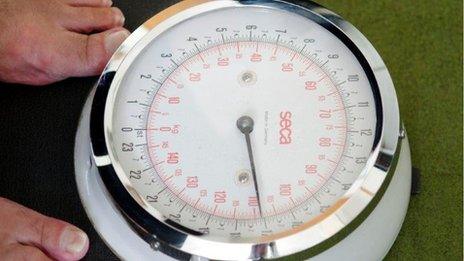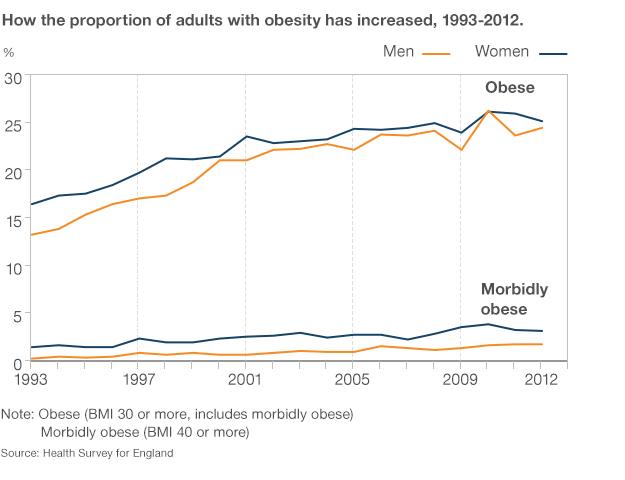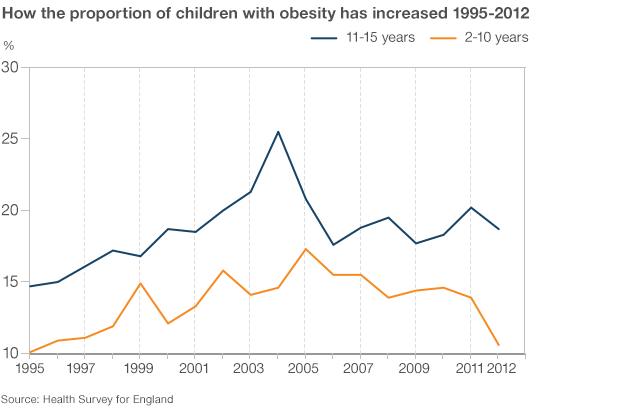Obesity: How worried should we be?
- Published
- comments

The festive period is barely behind us, but already there are more worrying headlines about obesity.
Monday's newspapers - and this website - warn the scale of the obesity crisis may be worse than feared.
The National Obesity Forum, external believes there is a "serious risk" the current projection - that half of adults will be obese by 2050 - could be exceeded.
After a fortnight of over-indulgence, could it possibly have come at a worse time?
Of course, the timing is not a coincidence.
This week is actually National Obesity Awareness Week, which has been timed to coincide with the traditional round of new year resolutions to become healthier.
The group behind the report is a well respected organisation set up by medical professionals over a decade ago.
Evidence emerging
It campaigns for stronger intervention on obesity - and has been critical of this government's approach which has been characterised by pursuing partnership working with industry through the "responsibility deal".
Suffice to say, it is in their interests to keep obesity in the news.

But is the latest warning justified?
The prediction that half of adults could be obese in the middle of this century dates back to the government-commissioned 2007 Foresight report, external.
At the time, the experts behind it admitted there was "uncertainty" about the predictions because there were so many variables that influenced obesity.
So it was always quite conceivable it could be worse than that.
Much will depend on government policies, but there are plenty of factors (genes and the ageing population to name two) that are also out of the control of ministers.
However, there is also evidence emerging that it might not be as bad as feared.
A quarter of both men and women are now classed as obese, up from 13% and 16% respectively in the early 1990s, according to the Health Survey for England.
But the majority of that rise was seen before the turn of the century.
The figures for children are perhaps even more upbeat.
In the past few years the numbers appear to have started levelling off, according to the health survey.
Life expectancy
Prof Alan Maryon-Davies, a former president of the UK Faculty of Public Health, thinks these statistics are encouraging.
"They suggest the worst-case scenarios we hear about are unlikely to happen. We seem to have turned the corner.
"It is hard to say exactly why, but certainly the message is getting through to some people."
That is not to say there is not a serious problem that needs addressing - Prof Maryon-Davies is clear there is - but equally it is important to recognise the progress that is being made to identify what works so the issue can be addressed.

After all, it has been proven beyond doubt that excess weight increases the risk of a range of diseases from cancers and heart disease to stroke and joint problems.
And this doesn't just affect the people who are carrying huge amounts of weight.
Moderate obesity can reduce life expectancy by three years, according to the National Obesity Observatory, external.
And it is not all about life or death either.
Obesity also has an effect on quality of life from living with the after-effects of the diseases caused by obesity to dealing with the restrictions it places on mobility and the increased chance of mental health problems.
But again it is worth digging deeper when considering risk.
Obesity is often said to be as bad as smoking.
And that is true - but only for the morbidly obese.
Both can reduce life expectancy by about eight to 10 years, according to the National Obesity Observatory.
But the numbers falling into the morbidly obese category remain small - 1.7% of men and 3.1% of women.
And the future for this group is even more difficult to gauge, with projections ranging from anywhere between little or no rise to a doubling by 2050.
None of this is aimed at dismissing the risk of obesity.
It remains a very serious threat to the health of the nation.
But the prognosis is not necessarily as gloomy as it can sometimes seem.